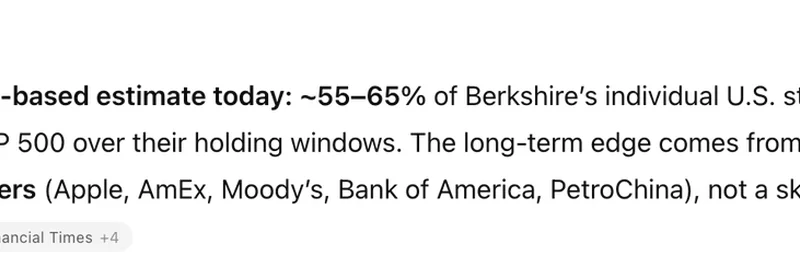In the world of investing, whether you're diving into traditional stocks or the wild ride of meme tokens, one principle keeps popping up: the power law. A recent tweet by @QwQiao perfectly captures this idea, drawing a clever parallel between public market investing—like what Warren Buffett does at Berkshire Hathaway—and venture capital. The tweet states: "so public market investing is the same as venture. low hit rate, steep power law." And it's backed by a insightful quote from the Financial Times.
Breaking Down the Power Law in Traditional Investing
Let's unpack what this means. The power law, in simple terms, is a distribution where a small number of events or items account for the majority of the results. In investing, it translates to a handful of massive winners carrying the entire portfolio, while most picks either underperform or just break even.
The Financial Times snippet in the tweet estimates that only about 55-65% of Berkshire Hathaway's individual U.S. stock positions have beaten the S&P 500 over their holding periods. That's not a sky-high success rate—it's more like a solid but unspectacular batting average. The real magic? It comes from outsized winners like Apple, American Express (AmEx), Moody's, Bank of America, and even PetroChina. These few bets have delivered enormous returns, outweighing the laggards and creating legendary long-term gains for Buffett and his investors.
This isn't just Buffett lore; it's a reminder that in public markets, you don't need to win every time. You need to win big when it counts. For more on Buffett's approach, check out resources like the Berkshire Hathaway annual letters.
How This Applies to Meme Tokens and Crypto
Now, flip this to the crypto space, especially meme tokens. If you've ever traded Dogecoin, Shiba Inu, or the latest viral coin on Solana, you know the drill: most meme tokens fizzle out or crash to near-zero. The hit rate? Often way lower than Buffett's 55-65%. We're talking single-digit percentages for tokens that truly "moon" and deliver 10x, 100x, or even 1,000x returns.
But here's the kicker—that's exactly the power law at work. In venture capital, which the tweet compares to public investing, funds like Sequoia or Andreessen Horowitz bet on dozens of startups, knowing most will fail. The unicorns, like Airbnb or Uber, make up for everything. Meme tokens operate on a similar steep curve: one Pepe or Bonk can turn a modest portfolio into a fortune, compensating for the duds.
For blockchain practitioners, this insight is gold. Meme tokens aren't just fun and games; they're a microcosm of high-risk, high-reward investing. The key is diversification—not putting all your eggs in one basket—but also having the conviction to hold onto potential winners. Tools like DexScreener or CoinMarketCap can help spot trends, but remember, timing and community hype play huge roles in meme success.
Lessons for Aspiring Crypto Investors
So, what can you take away from this as someone building or investing in blockchain?
Embrace the Low Hit Rate: Don't beat yourself up if most of your meme token picks don't pan out. It's normal, even for legends like Buffett.
Hunt for Power Law Winners: Focus on identifying those rare gems with strong narratives, active communities, and viral potential. Look for tokens tied to cultural moments or backed by influential creators.
Risk Management is Key: In crypto, unlike stocks, things can go to zero fast. Use strategies like position sizing—never risk more than you can afford to lose on any single bet.
Long-Term Perspective: Buffett's edge comes from holding winners over years. In meme land, "long-term" might be months, but the principle holds: don't sell your winners too early.
The tweet sparked some interesting replies, too. One user noted the status game in venture versus public markets, while another highlighted how VCs often see most investments go to zero—harsher than Buffett's world. It all underscores that whether you're in stocks, VC, or memes, the game is about surviving the losses and riding the winners.
Wrapping It Up
@QwQiao's tweet is a timely reminder that investing success isn't about being right all the time—it's about being spectacularly right a few times. For meme token enthusiasts, this means treating your portfolio like a VC fund: spread your bets, chase the power law, and stay informed through platforms like Meme Insider. If you're new to this, start small, learn the ropes, and who knows? Your next pick could be the Apple of meme coins.
Stay tuned to Meme Insider for more breakdowns on the latest in meme tokens and blockchain tech. What's your take on power law investing in crypto? Drop a comment below!



